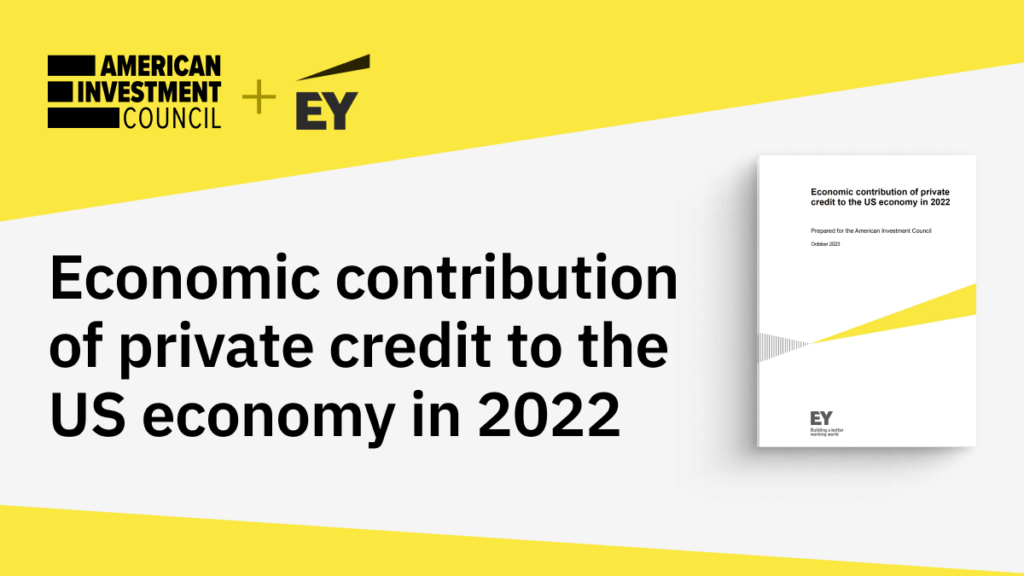New Report: Private Credit Helps Fuel Small Businesses, Offers Significant Boost to U.S. GDP
Private credit provides over $500 billion in capital to more than 3,600 businesses across America, supporting an estimated 1.6 million jobs, $137 billion in wages and benefits, and contributing $224 billion to the GDP

Washington, D.C. – The American Investment Council (AIC) released a report today, prepared by EY, on the significant impact of private credit on the U.S. economy. The report offers a detailed analysis of the economic contributions of the private credit industry, which includes its impact on job creation, wages, and broader economic activity.
“Following the 2008 financial crisis, many small businesses found it harder to gain access to the capital they need to grow and succeed,” said AIC President & CEO Drew Maloney. “This new report shows how private credit has helped fill the void and responsibly partners with thousands of businesses across America to increase growth, support jobs, and serve local communities.”
Private credit provides financing directly to businesses. The industry has become a valuable alternative to traditional lending from banks, especially for small- to medium-sized businesses that often do not qualify for loans from traditional banks or need capital beyond what banks are willing to provide. The sector has experienced remarkable growth in the U.S., soaring from less than $400 billion in assets in 2012 to $1 trillion by 2021. By that year, private credit comprised about 30% of the entire credit market.
Key Insights from the Report:
- Safe and Stable Financing: The top reasons businesses opted for private credit included certainty and speed (91%), more flexible covenants (77%), and stable relationship with a lender holding loans until maturity (65%). The report references the Federal Reserve’s Financial Stability Report from May 2023, which concluded that “the financial stability vulnerabilities posed by private credit funds appear limited.” Unlike traditional banks, private credit is not susceptible to “run risks” that could trigger financial crises. Investors commit funds for extended periods, preventing them from carrying out abrupt, large-scale withdrawals.
- Significant Economic Impact: Approximately $500 billion in private credit has been invested in more than 3,600 businesses across America. Private credit supported an estimated 1.6 million jobs in 2022, yielding $137 billion in wages and benefits and generating $224 billion for the GDP.
- Reliable Partner to Small Businesses: Private credit primarily served businesses with revenues below $100 million, and the median company receiving private credit had approximately 150 employees. Approximately 70% of U.S. private credit providers surveyed in 2021 reported that businesses relied on private credit because they were “too small for bank syndication.”
- Rising Allocations by Investors: In 2021, the largest group of investors – public and private pension funds – contributed approximately 31% of the total assets in private credit funds. Over half of investors plan to increase their private credit target allocation over the next three years.
- Support for American Jobs and Workers: Businesses of all sizes and sectors received private credit loans. Jobs in business services – such as finance and insurance, real estate, and rental and leasing – accounted for 40% of the total jobs supported by private credit. Other significant sectors included manufacturing (24%), personal services (14%), and information (10%).
- Investment Nationwide: All 50 states benefited from private credit investments. The states estimated to have the most workers supported by private credit were: (1) California (82,000 jobs), (2) Texas (46,000 jobs), (3) New York (38,000 jobs), (4) Florida (32,000 jobs), and (5) Illinois (27,000 jobs).
The AIC also released a new video today highlighting the advantages of private credit for small and medium-sized businesses. Private credit offers several benefits to businesses, including loan structures that are individually tailored to fit businesses’ needs and experienced investors who are committed to their success. Private credit plays a particularly critical role during periods of economic downturns; private credit capital is deployed counter-cyclically, meaning investors continue extending credit to businesses through hard times when other lenders often pull back.
AIC and EY analyzed more than 4,000 private credit deals that were active in 2022 at over 3,600 U.S. businesses. These deals were worth approximately $500 billion, and the businesses involved had roughly 2.8 million employees. The report provides estimates of the scale of private credit and the economic activity it supported in the U.S. in 2022.
Read the full report and methodology here.


